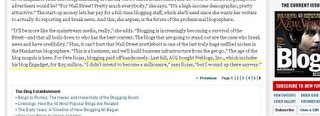Snowflakes Across The Western World

Rumsfeld speaks, you decide:
First, from the Fox TV affiliate via AP in San Diego
NEW YORK (AP) - Defense Secretary Donald Rumsfeld says the U.S. is prey to an "unacceptable, dangerous deficiency" in the way it talks to the world.
In a speech in New York, Rumsfeld said Al-Qaida and Islamic extremist groups have become expert at using the Internet to poison Muslim viewpoints. Rumsfeld tells the Council on Foreign Relations, "our government has not adapted."
Rumsfeld says the military has to adapt to changes in global media and better train officials about the importance of "timing and rapid response."
Rumsfeld calls the government's public affairs system antiquated. He says officials who work an eight-hour, five-day schedule can't keep up with a 24/7 world.
Next, the BBC
The US is losing the propaganda war against al-Qaeda and other enemies, defence chief Donald Rumsfeld has said.
It must modernise its methods to win the minds of Muslims in the "war on terror", as "enemies had skilfully adapted" to the media age, he said.
Washington and the army must respond faster to events and learn to exploit the internet and satellite TV, he said.
Separately, President Bush said the US should not be discouraged by setbacks in Iraq and must realise it is at war.
"We shouldn't be discouraged... because we've seen democracy change the world in the past," George W Bush said.
However, he also used his speech in Florida to claim progress in the war on al-Qaeda.
Mr Bush said that slowly but surely the US was finding terrorists where they hid.
'Newsroom battles'
Correspondents say that in recent months victory in the battle for public opinion has become a new front for the Bush administration.
In a speech to the Council of Foreign Relations, Mr Rumsfeld said some of the US' most critical battles were now in the "newsrooms".
"Our enemies have skilfully adapted to fighting wars in today's media age, but... our country has not," he said.
Mr Rumsfeld said al-Qaeda and other Islamic extremists were bombarding Muslims with negative images of the West, which had poisoned the public view of the US.
The US must fight back by operating a more effective, 24-hour propaganda machine, or risk a "dangerous deficiency," he said.
Government communications planning must be "a central component of every aspect of this struggle", he added.
"The longer it takes to put a strategic communications framework into place, the more we can be certain that the vacuum will be filled by the enemy."
THE United States lags dangerously behind al Qaeda and other enemies in getting out information in the digital media age and must update its old-fashioned methods, Defence Secretary Donald Rumsfeld said overnight. The Pentagon chief said today's weapons of war included e-mail, Blackberries, instant messaging, digital cameras and Web logs, or blogs. "Our enemies have skilfully adapted to fighting wars in today's media age, but ... our country has not adapted," Mr Rumsfeld said. "For the most part, the US government still functions as a 'five and dime' store in an eBay world," Mr Rumsfeld said, referring to old-fashioned US retail stores and the online auction house, respectively. Mr Rumsfeld said US military public affairs officers must learn to anticipate news and respond faster, and good public affairs officers should be rewarded with promotions. The military's information offices still operate mostly eight hours a day, five or six days a week while the challenges they faces occur 24 hours a day, seven days a week. Mr Rumsfeld called that a "dangerous deficiency." Massachusetts Sen. Ted Kennedy of the opposition Democratic Party immediately criticised Mr Rumsfeld as missing the point. "Clearly, we need to improve our public diplomacy and information age communication in the Muslim world," Mr Kennedy said in a statement. "But nothing has done more to encourage increased Al Qaeda recruitment and made America less safe than the war in Iraq and the incompetent way it's been managed. Our greatest failure is our policy." Mr Rumsfeld lamented that vast media attention about US abuses at Abu Ghraib prison in Iraq outweighed that given to the discovery of "Saddam Hussein's mass graves." On the emergence of satellite television and other media not under Arab state control, he said, "While al Qaeda and extremist movements have utilised this forum for many years ... we in the government have barely even begun to compete in
Modernisation is crucial to winning the hearts and minds of Muslims worldwide who are bombarded with negative images of the West, Mr Rumsfeld told the Council on Foreign Relations.




